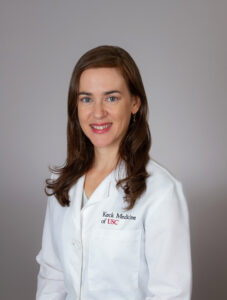Eugenia Castro, MS | USC Voice Center / California State University Los Angeles

Eugenia Castro is a recipient of the 2023 Dysphonia International Research Travel Award in partnership with The Voice Foundation. Eugenia participated in the 2023 Voice Foundation Conference and presented research entitled, “Reliability of Phonemically Loaded Sentences in Spanish for Identifying Laryngeal Dystonia (LD) by non-Spanish Speaking Speech-Language Pathologists.”
When asked to describe how her work will help patients, Eugenia stated “we developed a tool with high clinical significance in supporting the confidence of non-Spanish speaking clinicians when having to identify LD in Spanish-speaking individuals. This may improve access to care securing timely diagnosis and treatment for Spanish-speaking patients with LD.”
Below is an abstract of Eugenia’s podium presentation.
ABSTRACT
Additional Authors: Lauren Timmons Sund, BM, MS, CCC-SLP USC Caruso Department of Otolaryngology – Head and Neck Surgery. Dr. Fermin M. Zubiaur Gomar, FACS Escuela de Medicina, Universidad Panamericana, Clínica de la Voz – Ciudad de México. Melissa L. Wilson, PhD, MPH Department of Population and Public Health Sciences, USC Keck School of Medicine. Edie R. Hapner, PhD CCC-SLP, ASHA-F, UAB Department of Otolaryngology, UAB Voice Cener.
Introduction: Laryngeal dystonia (LD) is a focal dystonia affecting the intrinsic laryngeal muscles. No diagnostic test exists for LD, clinical diagnosis requires subjective evaluation by experienced clinicians and is primarily based on auditory-perceptual assessment (Daraei et al., 2014; Johnson et al., 2014; Ludlow et al., 2018). Several speech tasks are widely accepted to elicit diagnosis specific auditory-perceptual symptoms of glottal stops in adductor LD or breathy breaks in abductor LD in spoken English. These tasks include voiced and voiceless phonemes in counting and sentences (Cannito et al., 2014; Ludlow et al., 2018). There is a paucity of standard vocal tasks validated in languages other than English. With the growing Spanish speaking population in the US and lack of Spanish speech tasks to assist in identifying LD in Spanish speaking patients, assessing the reliability of phonemically loaded sentences in Spanish for use by non-Spanish speaking providers is critical.
Methods: Phonemically loaded sentences were developed for this study following current guidelines for assessment of LD (Cannito et al., 2014; Ludlow et al., 2018). Voice samples were obtained from native Spanish speaking individuals. Participants included 20 people with LD and 20 people without LD who served as controls. All participants were assessed by a Spanish-speaking Laryngolgoist. Audio samples were presented to non-Spanish speaking SLPs with expertise in working with people with LD who served as raters and classified the samples as either presence or absence of LD. Kappa and the intra-class correlation coefficient were calculated and mixed effects logistic regression was used for prediction.
Results: The inter and intra-rater reliability indicated statistically significant agreement. Sensitivity, specificity, and predictive values for the diagnosis of LD by the raters was overall high.
Conclusion: Our findings demonstrate that non-Spanish speaking SLPs with expertise in the assessment and treatment of LD can reliably identify the presence of LD using Spanish language stimuli in Spanish-speaking individuals. This study supports the use of the Spanish language phonemically loaded voiced and voiceless sentences by English speaking clinicians as an effective tool for identifying LD in Spanish speakers, perhaps mitigating diagnostic delays experienced by patients with LD.
Educational Objectives: Upon completion of this presentation, the participant should be able to: 1) Describe the limitations of assessment protocols for individuals with laryngeal dystonia 2) Describe considerations during stimuli translations and cultural adaptation to a language other than the original. 3) Apply novel stimuli developed in Spanish for the purposes of the current study in clinical practice to elicit signs and symptoms of LD in Spanish-speaking patients.
References: Cannito, M. P., Chorna, L. B., Kahane, J. C., & Dworkin, J. P. (2014). Influence of Consonant Voicing Characteristics on Sentence Production in Abductor Versus Adductor Spasmodic Dysphonia. Journal of Voice, 28(3), 394.e13-394.e22. https://doi.org/10.1016/j.jvoice.2013.10.010
Daraei, P., Villari, C. R., Rubin, A. D., Hillel, A. T., Hapner, E. R., Klein, A. M., & Johns, M. M. (2014). The Role of Laryngoscopy in the Diagnosis of Spasmodic Dysphonia. JAMA Otolaryngology–Head & Neck Surgery, 140(3), 228–232. https://doi.org/10.1001/jamaoto.2013.6450
Johnson, D. M., Hapner, E. R., Klein, A. M., Pethan, M., & Johns, M. M. (2014). Validation of a Telephone Screening Tool for Spasmodic Dysphonia and Vocal Fold Tremor. Journal of Voice, 28(6), 711–715. https://doi.org/10.1016/j.jvoice.2014.03.009
Ludlow, C. L., Domangue, R., Sharma, D., Jinnah, H. A., Perlmutter, J. S., Berke, G., Sapienza, C., Smith, M. E., Blumin, J. H., Kalata, C. E., Blindauer, K., Johns, M., Hapner, E., Harmon, A., Paniello, R., Adler, C. H., Crujido, L., Lott, D. G., Bansberg, S. F., … Stebbins, G. (2018). Consensus-Based Attributes for Identifying Patients With Spasmodic Dysphonia and Other Voice Disorders. JAMA Otolaryngology–Head & Neck Surgery, 144(8), 657–665. https://doi.org/10.1001/jamaoto.2018.0644
Contact Information: Email: mariaeugenia.castro@med.usc.edu
Sponsoring Organizations
The Fall Voice Conference is designed to encourage and educate professionals on a multi-disciplinary approach to the management of vocal disorders. The focus of this conference is the clinical care of patients with voice-related difficulties and how clinical and basic science research guide clinical care. For more information: fallvoice.org.
Dysphonia International is dedicated to improving the lives of people with spasmodic dysphonia and related voice conditions through research, education, awareness, and research.


